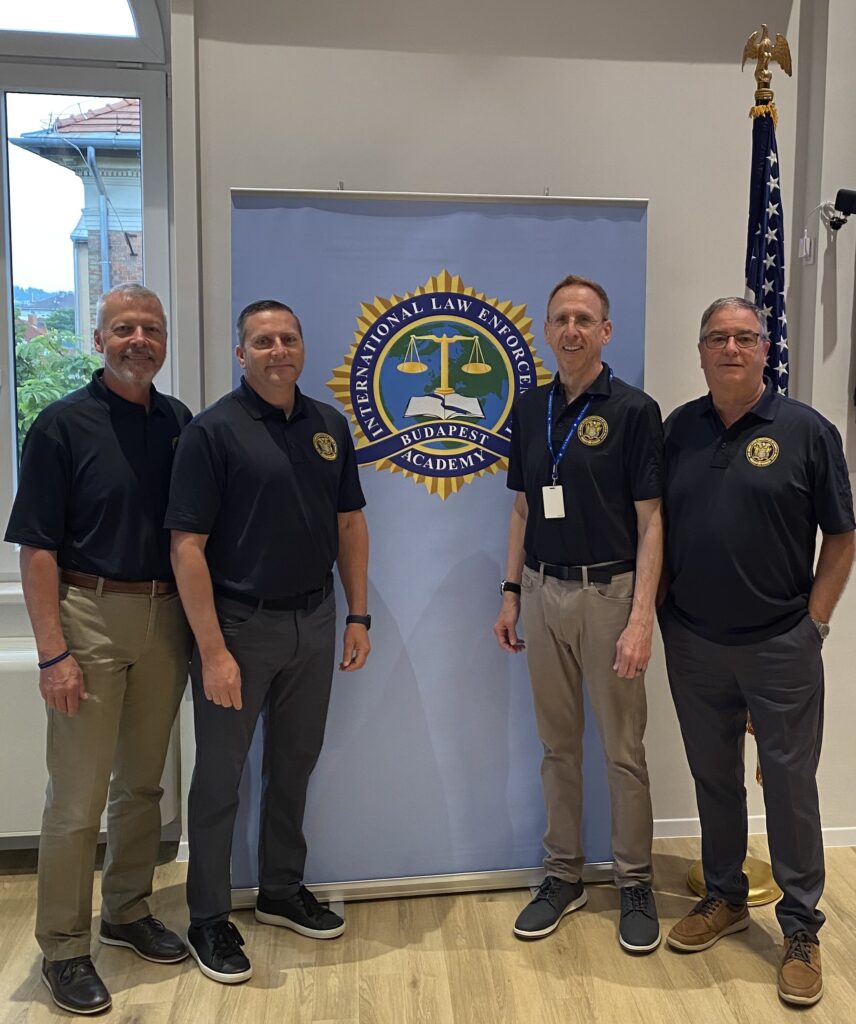NJSACOP’s Command & Leadership Academy Expands Across the Globe

NJSACOP’s Command & Leadership Academy Expands Across the Globe
Courses to be Held in Budapest and Botswana
TRENTON – January 16, 2025 – The NJSACOP’s Command & Leadership Academy has steadily developed into one of the nation’s premier law enforcement leadership development courses, attracting law enforcement leaders from across the eastern seaboard.
And now the academy is providing training overseas.
From June 10-21, 2024, four instructors from the NJSACOP travelled to Budapest, Hungary to teach its curriculum to command and supervisory officers from Croatia, Hungary, Slovenia, and Slovakia at the International Law Enforcement Academy (ILEA) in Budapest. The 32 participants included supervisory law enforcement officers, supervisory investigators, or other supervisory criminal justice officials, all of whom are required to share the knowledge gained with their colleagues.
The ILEA program is a U.S. Department of State, Bureau of International Narcotics and Law Enforcement Affairs (INL) initiative designed to enhance international cooperation and training for law enforcement agencies around the world. Established in partnership with host countries, ILEA facilities are located in regions worldwide, including Hungary, Thailand, Botswana, El Salvador, Ghana, and New Mexico, U.S.
The U.S. Department of State extended the invite to the NJSACOP because the academy is known for its unique blend of theory and application designed to create future leaders in law enforcement. Following the success of the initial program, federal officials have requested the NJSACOP deliver the Command and Leadership Academy program three more times in the upcoming months at ILEA locations in Budapest and Botswana.
Typically, the course runs 104 hours over 13 weeks. But to accommodate ILEA, NJSACOP academy instructors condensed the June program to 72 rigorous hours in nine days of instruction to fit the ILEA program. The curriculum integrates behavioral science theories and scenario-based learning to enhance education and skill development. The trainers included NJSACOP Executive Director Mitchell Sklar, NJSACOP Senior Fellow David Annets, NJSACOP Trainer Al Stiehler and Paul Sorrentino, Professional Development Director, NJSACOP.
“This collaboration between NJSACOP and ILEA exemplifies the strength and impact of international cooperation in law enforcement training,” said Edward Scott, Deputy Director of the International Law Enforcement Academy in Budapest. “Bringing together command-level officers from Croatia, Hungary, Slovenia, and Slovakia allows us to share valuable insights, foster cross-border partnerships, and create a foundation for mutual understanding. By integrating NJSACOP’s rigorous leadership curriculum, we’re helping to build a network of leaders equipped to address complex challenges on a global scale.”
The instructors delved into topics focused on developing leaders and encouraging strategic thinking.
NJSACOP emphasizes leadership as a science with logical thinking and critical methodology, along with police-oriented case studies. The intensive course encourages practical application of organizational theory within a law enforcement context.
“Hundreds of law enforcement supervisors have graduated from the program since the early 1990s, as the program initially expanded from New Jersey into five surrounding states”, Sorrentino said.
Sorrentino noted many command and supervisory personnel embrace the education, as the challenging curriculum is designed to force the students to find new methods to solve problems through logic, critical thinking, methodology and vision.
“During the program, students work in small groups to apply theories and solve real-life scenarios,” he said.
The curricula – following the leadership training that West Point cadets receive their junior year – focuses in four key areas: Preparing Yourself to Lead, Understanding and Motivating Others, Leading Great Teams and Leading Great Organizations.
“This program translates well for supervisory officers in law enforcement preparing for the next step,” said Sorrentino, highlighting that ILEA provides simultaneous interpretation and translation services to bridge language gaps.
These services ensure that international students who do not speak English have equal opportunities for interaction and engagement with classmates, similar to those of U.S. law enforcement officers. When the program was launched in 1992-93, there were northern and southern regions established for the course in New Jersey.
As the program expanded, Region 3 was added to serve Delaware, Maryland, Virginia and southern New Jersey. Region 4 was launched for Middlesex and Somerset counties. And then Region 5 came on board, comprising eastern Pennsylvania, through an arrangement with the Chester County Sheriff’s Office.
Academy students come from a wide variety of local, county, state and federal agencies including the FBI, the Federal Air Marshal Service and the US Marshals Service.
Photo Caption (L-R): NJSACOP Trainer Al Stiehler, NJSACOP Professional Development Director Paul Sorrentino, NJSACOP Executive Director Mitchell Sklar and NJSACOP Senior Fellow David Annets









